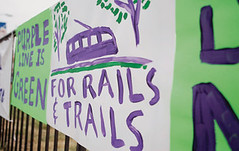Anti-purple line special interests

Image from the DC Examiner.
From Action Committee for Transit:
Note that this link to the press release has links to supporting documentation: Wealthy pay to fight Purple Line
CONSULTANTS FEAST AS WEALTHY PAY TO FIGHT PURPLE LINE
Are Columbia Country Club and a wealthy Chevy Chase municipality fighting against the Purple Line because they want to keep transit riders out of their exclusive precincts? Or are the prime movers of the opposition the consultants who profit from the effort to stop the light rail line?
This question becomes more urgent as new revelations emerge about the finances of anti-Purple Line efforts linked to the country club and the Town of Chevy Chase.
In the space of 12 months, the town has paid New York transportation consultant Sam Schwartz PLLC $374,000 to promote its anti-light rail efforts. This comes to more than $300 for each household residing in the town.
The town has also engaged the nationally prominent law firm Sidley Austin to represent it in the transit dispute. Sidley Austin has submitted to the Maryland Transit Administration an extensive request for information, much of which duplicates an informal request previously submitted by Columbia Country Club.
At present, the town's lawyers are working “pro bono”—without payment. However, Sidley Austin's web site states that the firm's pro bono work is done “to provide legal services to the poor and to charitable, religious, community, governmental and educational organizations that otherwise would be unable to afford legal representation.” The town can easily afford to pay for legal services. Its most recent financial statement shows it has $4.4 million tucked away in the bank—more than its entire annual budget of $3 million.
Pat Burda, chair of the committee in charge of the town's anti-Purple Line activities, is the wife of Joseph Guerra, a partner in Sidley Austin. One of Mr. Guerra's legal specialties is defending corporations accused of contributing to global warming. The relationship between Ms. Burda and Mr. Guerra was not disclosed to the public when the town chose Sidley Austin as its lawyers.
Challenges to environmental impact statements for major transportation projects are complex legal matters that typically involve substantial amounts of attorney time and—if the time is not donated—substantial fees. Meanwhile, an anti-Purple Line group linked to Columbia Country Club has re-emerged. The leak of a March 24, 2008, letter from the Country Club's president, J. Paul McNamara, revealed a plan to “launch a grassroots campaign to identify and organize a broad and diverse coalition of opponents to the current proposal for the Purple Line.” The McNamara letter did not reveal how much the country club—which charges an initiation fee of $70,000—is spending, but the expenditure cannot be small. Not enough money could be found in an annual budget of more than ten million dollars, and the club is drawing from its capital reserves.
Soon after the McNamara letter was exposed, a new anti-Purple Line group called Alliance for Smart Transportation (A4ST) appeared. A4ST's website was registered in the Madeira Islands, a tax haven located off the coast of Africa, through a service called Domain Discreet that conceals the name of the true owner. Research by Katherine Shaver of the Washington Post revealed that A4ST is headed by Geoffrey Gonella, a member of Columbia Country Club's Board of Governors. Gonella is a lobbyist who specializes in creating “grassroots” backing for paying clients, a practice often referred to as “astroturf.”
The appearance of A4ST recalls a 1995 affair involving Glenn Cowan, a member of the group's executive committee. Cowan's lobbying firm was hired by long-distance companies to oppose a telecommunications bill. A subcontractor took 48,000 names gathered in previous phone company campaigns and signed them to mailgrams sent to Congress without contacting the people again. In Washington Post interviews after the matter was exposed, Cowan and the subcontractor each said the other company had made the decision to use signatures without permission.
Cowan, a pioneer of astroturf lobbying, has also worked for the oil, tobacco, and drug industries. In 1990, he helped create a group called Nevadans for Fair Fuel Economy Standards to fight the Clean Air Act. Cowan's consulting firm was working for automobile manufacturers, but most of the people on the group's letterhead later contacted by the Boston Globe said that they had not been informed of the industry sponsorship.
“I got the impression this was a group of concerned people and not the auto industry. It was done in a surreptitious manner,” county government official Bob Stewart told the Globe.
“With opposition to the Purple Line shrinking to a tiny hard core, the time has come to bring this long-running controversy to a conclusion,” commented Ben Ross, president of the Action Committee for Transit. “Narrow economic interests should not be allowed to deprive the public of badly needed transportation.”
Labels: civic engagement, transit, transportation planning



0 Comments:
Post a Comment
<< Home